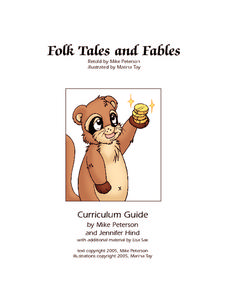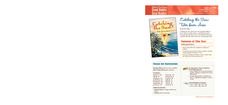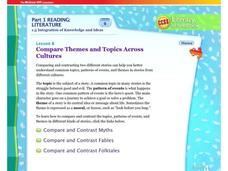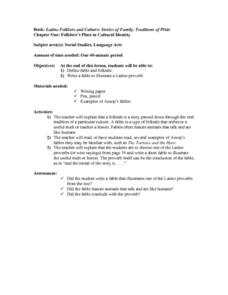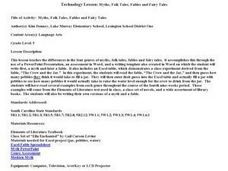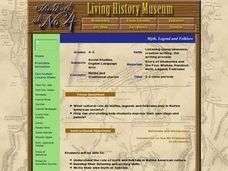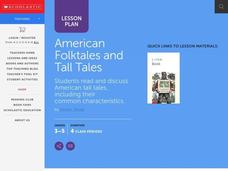Weekly Story Book
Folk Tales and Fables
Pages and pages of engaging activities, worksheets, and writing projects on teaching folktales and fables await you! You don't want to miss this incredible resource that not only includes a wide range of topics and graphic organizers,...
Curated OER
Those Fabulous Fables
A video leads off this activity on fables, introducing the class to this important form of traditional storytelling. The group defines fable and hears an explanation of the origin of this type of folk tale. They summarize the story they...
Curated OER
Mayan Myths/Folktales
Middle schoolers work on summarizing a story, and they determine if it is a legend, a myth, or a fable. Working in groups to read and summarize stories, they then list evidence whether the tale is a myth, fable, or legend. They present...
Pearson
Catching the Sun: Tales from Asia
Explore the folklore of Asia and the South Pacific with this language arts lesson series. Complementing a reading of Catching the Sun: Tales from Asia by Jan M. Mike, this resource supports learners with understanding cause and effect...
McGraw Hill
Compare Themes and Topics Across Cultures
Compare and contrast folktales, myths, and fables in an interactive eBook. The interactive is broken up into three topics: myths, fables, and folktales. Each section includes a reading passage and a guided lesson on the theme, topic, and...
Curated OER
What Makes a Fable?
Third graders explore fables. In this fables lesson, 3rd graders use Venn Diagrams to organize information about 2 fables they will read. Students work in groups to fill out the diagrams and share their results with the class. Students...
Curated OER
Latino Folklore and Culture: Stories of Family, Traditions of Pride
Students define the terms fable and folktale. They write a fable to illustrate a Latino proverb. Students are explained that a folktale is a story passed down through the oral tradition of a particular culture. A fable is a type of...
Curated OER
Secret Stories: Exploring the Elements of Folktales and Fables
Students are introduced to the characteristics of fables and folktales. In groups, they read and identify the various elements in the stories they read from around the world. For each story, they analyze the setting and the various...
Curated OER
Myths, Folk Tales, Fables and Fairy Tales
Fifth graders study the differences in the four genres of myths, folk tales, fables and fairy tales. They use a PowerPoint Presentation, an assessment in Word, and a writing template also created in Word on which they write first, a...
Curated OER
Fables Unit Lesson Plan
Students study fables in a broad context. In this literary lesson on fables, students define terms unique to them. Students use a variety of technological resources to gather and classify information into three categories. Students also...
Curated OER
Fables and Trickster Tales Around the World
Students analyze fables and trickster tales from various cultural traditions. In this fable analysis lesson, students identify the elements of fables and trickster stories. Students read Aesop's fables and Ananse spider stories. Students...
August House
Anansi and the Pot of Beans
Anansi is a tricky character, but can he realize he's wrong and write an apology letter? Learners use Anansi and the Pot of Beans to practice writing, art, and figurative language. A series of activities are engaging for both advanced...
Curated OER
Greek culture and Aesop's Fables
Tenth graders explain political and social thought during the Greek 6th and 5th centuries B.C. They research five to eight fables, figuring out the moral for each and writing an essay on how Aesop influenced the morals and ideals of...
Curated OER
Is That a Fact? A Comment on Modern Fables
Learners complete literary analysis for modern fables or urban legends. In this modern fables lesson, students listen to an urban legend and discuss it. Learners then research urban legends online and write their own urban legend.
Curated OER
Myth, Legend and Folklore
Students examine the role of myths and folklore in the Native American culture. They listen to examples of oral history and write their own. They share their story with the class.
Curated OER
Elements of the Oral Tradition
Various genres of oral tradition are outlined and defined in these slides. Give your class examples of folk tales, fairy tales, parables, fables, legends, and myths before reading an example of one of these stories. This overview acts as...
Curated OER
Storytelling
Students explore the origins of folktales, fairytales, myths, legends, fables, and folktales in the ten lessons of this unit. A storytelling festival is held to feature the results of the variety of activities presented in the unit.
Curated OER
American Folktales and Tall Tales
Middle schoolers explore the elements of American folktales. They discuss how they are passed on from generation to generation, how they use exaggeration, and how they convey a message or make a point. Students identify common elements...
K5 Learning
The Wolf
Fourth graders have likely heard the expression to cry wolf, but they may not know the saying's origin. A short reading passage tells the story and includes four comprehension questions for pupils to demonstrate their understanding.
K5 Learning
Androclus and the Lion
Kindness is never a standalone act. Fourth graders read the classic tale of Androclus and his act of service to the lion, which is repaid to him by the lion in a Roman colosseum. After reading the passage, they answer four comprehension...
August House
The Hidden Feast
What is a proverb? This is the leading question of this resource. First, explore proverbs and their meanings. Then, read aloud The Hidden Feast: A Folktale from the American South by Martha Hamilton and Mitch Weiss and partake in a grand...
Curated OER
Technology-commected Folklife Lesson Plan: Fables
Learners discuss ways the stories were alike and different. The teacher demonstrate how to draw a Venn diagram using Microsoft Word. They label the two circles and enter the likenesses and differences on the diagram.
NWT Literacy Council
Readers Theatre Scripts
Engage and entertain young learners with this collection of readers theatre activities. With over 25 different scripts, a wide range of topics are covered from simple counting and rhyming exercises to adaptions of popular children's...
Curated OER
Writing Own Tale
Third graders read The First Strawberries and complete a character chart. In this writing a tale lesson, 3rd graders discuss viewpoints and identify character traits. Students complete character charts and write their own tale about how...


